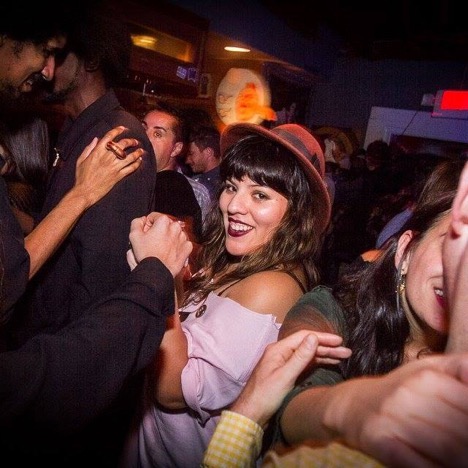
By Isabella Gomez
By day, Josephine Figueroa is a filmmaker and programming coordinator at the Atlanta Film Society. By night, she is a curator for the city’s trendiest parties and gallery openings. Around the clock, she has one mission: to open spaces for the Latinx community.
Latinx is a gender-neutral word to describe people with Latin American heritage. Figueroa ’s family is from Peru, but she has lived in Georgia since age 6. Growing up in the South, where she says race has always been a prevalent issue, her Latin American culture became an important aspect of her identity from an early age. But she did not always see a space for that culture in mainstream channels.
“I feel like some of the biggest issues that we face are a lack of representation in film and media,” she says. “That’s pretty huge to me and that’s why I studied film, really – to make our identities visible.”
At 22, she began making documentaries about the experiences of undocumented youth in Georgia. She felt humbled by the challenges these young people faced and yearned for a way to unite all of those who fell under the spectrum of Latinx heritage, which she sees as an incredibly diverse group from many countries and traditions.
In 2016, she formed Somos Sur Art Collective to bring together Latinx creators and showcase their artwork. The collective began appearing at galleries around the city and establishing a name for themselves as a tight-knit, creative community. Still, Josephine felt that there had to be a way to reach more people, even those who did not express this facet of their identities through painting or photography.
Then, she and her cousin Kenneth threw a house party that quickly grew into an Atlanta nightlife staple – La Choloteca: Ley de Latinx. The first part of the name comes from cholo, a term of endearment used between her and her cousins. The second part came from Kenneth’s reaction to the tragedy that struck a gay Orlando nightclub in June of 2016.
“I think he really identified with the Latinx term, especially after the Pulse shootings, because of feeling like the word Latino did not represent enough of his queer identity,” she explains. “But Latinx was so much more inviting and safe.”
In a matter of months, La Choloteca went from being a gathering of friends dancing to Selena at Figueroa’s house to the hottest party at MJQ. Always free, always fun, and always accessible, the event includes a lineup of Latinx DJs from around t
he city and encourages people from all walks of life to celebrate the music and culture that brings Latin American countries together. La Choloteca is held monthly, but as Josephine is quick to point out, it’s more than just a Latinx night of clubbing.
“Every single party, we raise money for an organization or cause we support. We normally raise between $300 and $500, so organizations working within the Latino/a/x community are impacted by this party, as well,” she says. In 2017, Creative Loafing named it the Best Way to Get Down and Do Good.
Apart from organizing the hottest rumba in town, Figueroa is also working to highlight Latin American filmmakers for a series called CineMás. Presented by the Atlanta Film Society, it brings movies from across South America to the historic Plaza Theatre.
She’s also picked up a DJing alter ego, La Superior and hopes to start a program to teach teen girls how to disc jockey. With this idea, a teenage version of La Choloteca has crossed her mind. Creative outlets like these, she says, are a major way to find joy in standing up for marginalized identities.
“As a person of color, I think sometimes we are so used to surviving that we don’t really know what it’s like to thrive, so much so that we might not even be fighting for it,” she explains. “So for me, La Choloteca and Somos Sur is fighting for our community to thrive.”